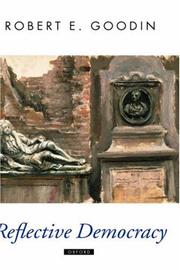| Listing 1 - 10 of 33 | << page >> |
Sort by
|
Book

ISBN: 9780231152983 0231152981 Year: 2010 Publisher: New York Columbia university press
Abstract | Keywords | Export | Availability | Bookmark
 Loading...
Loading...Choose an application
- Reference Manager
- EndNote
- RefWorks (Direct export to RefWorks)
"Is it meaningful to call oneself a democrat? And if so, how do you interpret the word?" In responding to this question, eight iconoclastic thinkers prove the rich potential of democracy, along with its critical weaknesses, and reconceive the practice to accommodate new political and cultural realities. Giorgio Agamben traces the tense history of constitutions and their coexistence with various governments. Alain Badiou contrasts current democratic practice with democratic communism. Daniel Bensaid ponders the institutionalization of democracy, while Wendy Brown discusses the democratization of society under neoliberalism. Jean-Luc Nancy measures the difference between democracy as a form of rule and as a human end, and Jacques Rancière highlights its egalitarian nature. Kristin Ross identifies hierarchical relationships within democratic practice, and Slavoj Zizek complicates the distinction between those who desire to own the state and those who wish to do without it. Concentrating on the classical roots of democracy and its changing meaning over time and within different contexts, these essays uniquely defend what is left of the left-wing tradition after the fall of Soviet communism. They confront disincentives to active democratic participation that have caused voter turnout to decline in western countries, and they address electoral indifference by invoking and reviving the tradition of citizen involvement. Passionately written and theoretically rich, this collection speaks to all facets of modern political and democratic debate.
Book
ISBN: 9780230116993 023011699X Year: 2011 Publisher: Basingstoke: Palgrave MacMillan,
Abstract | Keywords | Export | Availability | Bookmark
 Loading...
Loading...Choose an application
- Reference Manager
- EndNote
- RefWorks (Direct export to RefWorks)
Democracy --- Philosophy --- DemocracyPhilosophy --- Democracy - Philosophy
Book
ISBN: 9780691155654 0691155658 Year: 2013 Publisher: Princeton Princeton university press
Abstract | Keywords | Export | Availability | Bookmark
 Loading...
Loading...Choose an application
- Reference Manager
- EndNote
- RefWorks (Direct export to RefWorks)
Democracy --- Majorities --- Philosophy --- Democracy - Philosophy
Book
ISBN: 9780691163338 0691163332 Year: 2011 Publisher: New York (N.Y.) Russell Sage Foundation
Abstract | Keywords | Export | Availability | Bookmark
 Loading...
Loading...Choose an application
- Reference Manager
- EndNote
- RefWorks (Direct export to RefWorks)
Pragmatism and its consequences are central issues in American politics today, yet scholars rarely examine in detail the relationship between pragmatism and politics. In The Priority of Democracy, Jack Knight and James Johnson systematically explore the subject and make a strong case for adopting a pragmatist approach to democratic politics--and for giving priority to democracy in the process of selecting and reforming political institutions. What is the primary value of democracy? When should we make decisions democratically and when should we rely on markets? And when should we accept the decisions of unelected officials, such as judges or bureaucrats? Knight and Johnson explore how a commitment to pragmatism should affect our answers to such important questions. They conclude that democracy is a good way of determining how these kinds of decisions should be made--even if what the democratic process determines is that not all decisions should be made democratically. So, for example, the democratically elected U.S. Congress may legitimately remove monetary policy from democratic decision-making by putting it under the control of the Federal Reserve. Knight and Johnson argue that pragmatism offers an original and compelling justification of democracy in terms of the unique contributions democratic institutions can make to processes of institutional choice. This focus highlights the important role that democracy plays, not in achieving consensus or commonality, but rather in addressing conflicts. Indeed, Knight and Johnson suggest that democratic politics is perhaps best seen less as a way of reaching consensus or agreement than as a way of structuring the terms of persistent disagreement.
Democracy --- Political science --- Philosophy --- Democracy - Philosophy
Book
Abstract | Keywords | Export | Availability | Bookmark
 Loading...
Loading...Choose an application
- Reference Manager
- EndNote
- RefWorks (Direct export to RefWorks)
Decolonizing Democracy: Intersections of Philosophy and Postcolonial Theory analyzes the concept and the discourse of democracy. Ferit Güven demonstrates how democracy is deployed as a neo-colonial tool to discipline and further subjugate formerly colonized peoples and spaces. The book explains why increasing democratization of the political space in the last three decades produced an increasing dissatisfaction and alienation from the process of governance, rather than a contentment as one might have expected from ""the rule of the people." Decolonizing Democracy aims to provide a conceptual r
Democracy -- Philosophy. --- Postcolonialism. --- Democracy --- Postcolonialism --- Philosophy

ISBN: 9786610703913 1280703911 0195350405 9780195350401 6610703914 9780195136593 0195136594 9780195136609 0195136608 0195136608 0195136594 9781280703911 0197731287 Year: 2023 Publisher: New York ; Oxford University Press,
Abstract | Keywords | Export | Availability | Bookmark
 Loading...
Loading...Choose an application
- Reference Manager
- EndNote
- RefWorks (Direct export to RefWorks)
This volume collects some of the leading essays in contemporary democratic theory published since 1970. The anthology presents the work of a select group of contributors and covers many foundational approaches defended by scholars from a range of different disciplines.
Democracia --- Filosofía política --- Libros electrónicos --- Democracy --- Philosophy. --- Democracy - Philosophy.
Book
ISBN: 9780197540824 9780197540817 0197540821 0197540813 0197540848 Year: 2022 Publisher: Oxford Oxford university press
Abstract | Keywords | Export | Availability | Bookmark
 Loading...
Loading...Choose an application
- Reference Manager
- EndNote
- RefWorks (Direct export to RefWorks)
"Around the world, faith in democracy is falling. Partisanship and mutual distrust are increasing. What, if anything, should we do about these problems? In this accessible work, leading philosophers Jason Brennan and Hélène Landemore debate whether the solution lies in having less democracy or more. Brennan argues that democracy has systematic flaws, and that democracy does not and cannot work the way most of us commonly assume. He argues the best solution is to limit democracy's scope and to experiment with certain voting systems that can overcome democracy's problems. Landemore argues that democracy's virtues, which stem, at an ideal level, from its inclusiveness and egalitarian distribution of power, are not properly manifested in the historical regime form that we call "representative democracy." Whereas "representative democracy" centers an oligarchic form of representation by elected officials, Landemore defends s a more authentic paradigm of popular rule-open democracy--in which legislative power is open to all on an equal basis, including via lottery-based mechanisms"--
Democracy - Philosophy. --- Democracy - Moral and ethical aspects. --- Democracy
Book
ISBN: 9780226681702 Year: 2022 Publisher: Chicago : University of Chicago Press,
Abstract | Keywords | Export | Availability | Bookmark
 Loading...
Loading...Choose an application
- Reference Manager
- EndNote
- RefWorks (Direct export to RefWorks)
In The Paradox of Democracy: New Media and the Eternal Problem of Politics, Sean Illing and Zac Gershberg argue that, although free speech and media has always been a necessary condition of democracy, that very freedom also is its greatest threat. Free speech gives those who would destroy democracy license to mislead the public, using whatever forms of media are available. New forms of media offer opportunities to both supporters and critics of democracy. Reaching back to the ancient Greeks and continuing through media disruptions such as the invention of the printing press, the growth of "yellow" journalism and mass circulation newspapers, to new media today, they contend that democracies have always been unsettled by changes in media. The authors trace how each of these changes have challenged democracy by providing new ways of talking about politics and of reaching audiences with often unsettling effects. They conclude by exploring what kinds of communication facilitates and defends democracy as changing technology overwhelms older forms of communication.

ISBN: 0199256179 9780199256174 Year: 2003 Publisher: Oxford Oxford university press
Abstract | Keywords | Export | Availability | Bookmark
 Loading...
Loading...Choose an application
- Reference Manager
- EndNote
- RefWorks (Direct export to RefWorks)
Democracy --- Consensus (Social sciences) --- Philosophy. --- Authority --- Common good --- General will --- Power (Social sciences) --- Philosophy --- Democracy - Philosophy.
Book
ISBN: 9780190924195 9780190924201 9780190924218 9780190924225 9780197619100 0190924195 0190924225 019761910X Year: 2019 Publisher: Oxford Oxford University Press
Abstract | Keywords | Export | Availability | Bookmark
 Loading...
Loading...Choose an application
- Reference Manager
- EndNote
- RefWorks (Direct export to RefWorks)
"We live in an age of political polarization. As political beliefs on the left and the right have been pulled closer to the extremes, so have our social environments: we seldom interact with those with whom we don't see eye to eye. Making matters worse, we are being appealed to--by companies, products, and teams, for example--based on our deep-seated, polarized beliefs. Our choice of Starbucks or Dunkin' Donuts, Costco or Sam's Club, soccer or football, New York Times vs. Wall Street Journal is an expression of our beliefs and a reinforcement of our choice to stay within the confines of our self-selected political community, making us even more polarized. Letting it bleed into these choices in every corner of our lives, we take democracy too far and it ends up keeping us apart. We overdo democracy. When we overdo democracy, we allow it to undermine and crowd out many of the most important social goods that democracy is meant to deliver. What's more, in overdoing democracy, we spoil certain social goods that democracy needs in order to flourish. A thriving democracy needs citizens to reserve space in their social lives for collective activities that are not structured by political allegiances. To ensure the health and the future of democracy, we need to forge civic friendships by working together in social contexts in which political affiliations and party loyalties are not merely suppressed, but utterly beside the point. Drawing on his extensive research, Talisse sheds light on just how deeply entrenched our political polarization has become and opens our eyes to how often we allow politics to dictate the way we see almost everything. By limiting our interactions with others and our experience of the world so that we only encounter the politically like-minded, we are actually damaging the thing that democracy is meant to preserve in the first place: the more fundamental good of recognizing and respecting each other's standing as equals."--
Democracy --- Political participation --- Philosophy --- Political philosophy. Social philosophy --- Démocratie participative --- Démocratie -- Philosophie --- Democracy - Philosophy
| Listing 1 - 10 of 33 | << page >> |
Sort by
|

 Search
Search Feedback
Feedback About
About Help
Help News
News